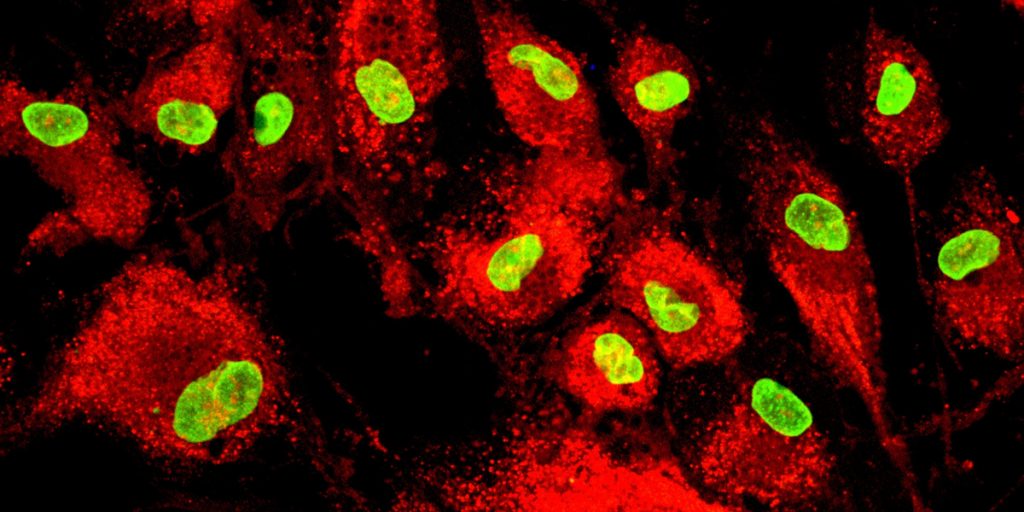Since the outbreak of the new type of coronavirus pneumonia (COVID-19) in December 2019, the scientific community has been working fervently to develop treatments to combat the disease. Globally, scientists are exploring every potential weapon to suppress the global threat. Approaches under investigation include vaccines, medications, combination therapies, and perhaps most interestingly, living therapies with promising cell types such as natural killer (NK) cells, stem cells and exosomes.
MSCs as a Tool Against Coronavirus
While many approaches are being investigated, mesenchymal stem cells (MSCs) have emerged at the forefront as a promising tool for the treatment of patients with Coronavirus infection. This is because there is a solid foundation of scientific literature and early stage trials to support the use of MSCs for the respiratory distress and lung issues related to COVID-19.
Furthermore, in research published in the peer-reviewed journal Aging and Disease, Chinese scientists recently reported that seven COVID-19 patients improved following infusion with allogeneic MSCs.
This collaborative project was led by researchers from Shanghai University and Peking Union Medical College (PUMC) and Chinese Academy of Medical Sciences (CAMS). The study evaluated the clinical outcomes of seven patients treated with allogenic MSC therapy at Beijing You’an Hospital over a two week period.
The researchers noted that the MSC treatment substantially improved the “functional outcomes” of all patients without observed adverse effects. Specifically, symptoms of all seven of patients were reduced in two days and three patients were discharged after three days of treatment.
This research was published in the peer-reviewed journal Aging and Disease.
MSC Clinical Trials for Coronavirus
Since the outbreak of the new type of coronavirus pneumonia (COVID-19) in December 2019, scientists and clinicians have been in a rush suppress the disease. Mesenchymal stem cells (MSCs) present intriguing potential for use in this effort, because they exert powerful immunomodulatory effects when administered intravenously.
Currently, MSCs are being tested in more than 1,000 trials worldwide for diverse range of clinical indications, providing evidence of an acceptable safety profile.
Through mechanisms such as improving the lung microenvironment, inhibiting the immune system over-activation, promoting tissue repair, protecting lung alveoli epithelial cells, preventing pulmonary fibrosis, and improving lung function, MSCs may participate in the global management of COVID-19 related illness and death.
Currently, ClinicalTrials.gov and the World Health Organization International Clinical Trials Registry Platform (WHO ICTRP) report a combined 29 trials exploring the potential of stem cells for treating COVID-19.
Specifically, ClinicalTrials.gov reports 8 clinical trials, one of which has been withdrawn by the sponsor. The WHO International Clinical Trials Registry Platform (ICTRP) reports 21 clinical trials with Chinese Clinical Trial Register (“ChiCTR”) numbers, of which five have been withdrawn by the sponsors.
Interestingly, four of the six withdrawn trials were submitted by the same Chinese company, Guangzhou Reborn Health Management Consultation Co., LTD.
Thus, there are 23 active stem cell trials for COVID-19, the vast majority of which utilize MSCs.
16 of the ongoing trials have Chinese Clinical Trial Register (“ChiCTR”) numbers and 7 have National Clinical Trial (NCT) numbers. When all trial types are considered, there are over 400 trials worldwide exploring approaches to diagnosing, treating or managing COVID-19.
The list below shows the 16 active stem cell trials against COVID-19 with ChiCTR-numbers and 7 with NCT-numbers, for a total of 23 active trials:
- NCT04252118
- NCT04273646
- NCT04288102
- NCT04276987
- NCT04299152
- NCT04302519
- NCT04269525
- ChiCTR2000030866
- ChiCTR2000030835
- ChiCTR2000030484
- ChiCTR2000030300
- ChiCTR2000030224
- ChiCTR2000030138
- ChiCTR2000030261
- ChiCTR2000030173
- ChiCTR2000030116
- ChiCTR2000030088
- ChiCTR2000030020
- ChiCTR2000029990
- ChiCTR2000029606
- ChiCTR2000029572
- ChiCTR2000029580
- ChiCTR2000029569
Among the 23 active trials reported by WHO ICTRP and ClinicalTrials.gov, 19 of them are using MSCs.
The six stem cell trials for Coronavirus that have been withdrawn to date are:
- ChiCTR2000030329
- ChiCTR2000029816
- ChiCTR2000029817
- ChiCTR2000029812
- ChiCTR2000029818
- NCT04293692
Coronavirus Related Lung Damage and Distress
Similar to SARS, the novel coronavirus attacks the human body by attaching to the angiotensin-converting enzyme-2 (ACE2), a protective enzyme against lung damage. In acute stages, the virus induces a cytokine storm in the lung, an exaggerated immune response, causing severe inflammation. As the immune cells deplete and the system becomes weakened, other organs as well as the lungs are also damaged.
The likelihood of this outcome is heighten for the patients with pre-existing conditions, such as cardiovascular disease. The inflammation and immune damage caused by COVID-19 makes the scientific community primed to consider the prospects of using MSCs for immunomodulation.
As described by RoosterBio, a company specializing in human MSC manufacturing, “Efforts to treat damage to lungs or facilitate rehabilitation in COVID-19 may reap plausible benefit via allogeneic mesenchymal stem/stromal cells (MSCs), which have been deployed into tens of thousands of patients via over 1000 unique clinical trials in the last 10 years, including several for non-COVID related respiratory distress.”
In cases of COVID-19 that produce serious complications, such as acute respiratory distress syndrome, sepsis or cytokine release syndrome, Cynata’s Cymerus™ derived MSCs may be positioned to fill the void. This is because the company’s iPSC-derived MSCs have demonstrated improvements for these indications in preclinical studies.
Similarly, Mesoblast’s cryopreserved MSCs (Remestemcel-L) has proven to be effective in treating advanced respiratory distress. Athersys has reported positive outcomes in other studies using MSCs to treat respiratory disease.
Pluristem Therapeutics is also exploring the use of its PLX cells (placenta-derived, mesenchymal-like adherent stromal cells) for treating respiratory and inflammatory complications induced by COVID-19. These cells are designed to be administered to patients without the need for tissue or genetic matching.
What are your thoughts on using MSCs to manage the global Coronavirus outbreak? Share them in the comments below.
